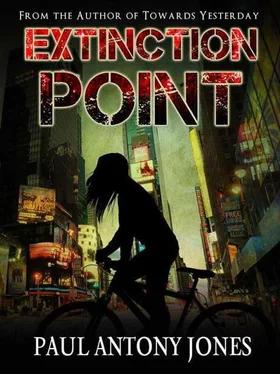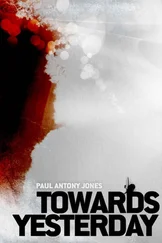* * *
The colorful mosaic of painted glass lent an otherworldly etherealness to the church, sunshine pouring like wine through the beautifully colored scenes, but at night, without the sun’s illumination, the window was black and lifeless.
Soulless.
The aged priest understood the dichotomy.
To compensate for the loss of light; once the sun set, hidden blue and red spotlights sparked into life, tastefully highlighting the effigy of the suffering Christ hanging from the cross, his face a mask of suffering. The sculptor had captured perfectly Christ’s torment; a vicious crown of thorns digging into his head, a spear wound in his side bleeding water and blood down over his hip. His agony was so obvious; his suffering so profound, that no one looking upon the scene could fail to be moved by the enormity of this God-man’s sacrifice.
That was not what the Monsignor saw.
He saw an icon of deception, a promise to the human race that would never be fulfilled, could never be fulfilled. An empty vessel of a lie as hollow and dead as the very tomb that the crucified man was finally laid to rest in.
As empty as he now felt.
Like a cancer, his own despair had eaten through him, coring him out like termites devouring the foundation of his spiritual house, until finally, with nothing left to support it his belief had collapsed in on itself. And, for the past three years, Monsignor Jacob Pike had been faithless.
He no longer believed in the wonder, the resurrection or any of the underpinning principles that had drawn him to the Church and a life of service to God. He performed his daily duties out of habit rather than devotion. He was unworthy, he knew, to be a leader of his flock.
How could he be expected to lead when he was so lost himself?
He had so very many questions, and not one of them could he find an answer to within the pages of the book of books.
That first morning, he awakened with a feeling of disquiet and unrest in the pit of his stomach. Stumbling through the morning prayers and service, he found himself distracted and unsure of himself, something that he had never experienced before in his forty-two years as a priest.
For a while, he thought he may be sick. And in a way, he supposed he was sick, but it was a malady of the soul, not of the flesh. It would have been so much easier to deal with a life-threatening illness; instead, he was facing a much harsher future.
The feeling of disquiet only grew stronger with each passing day until, finally, today ; he realized that he was empty of all feeling for the Church, for the religion… and for life.
He had prayed every day for guidance. Beseeching the Lord God Almighty to show him the way back to the path of enlightenment, to help him find his way home, to guide him back to divinity. Every day he awaited an answer, and every day he drifted further away from his religion when no answer came.
Finally, he had stopped trying, too tired and too old to continue to bother. The Church had priests trained to help those like him but he knew that would have involved him stepping down from his position within the parish, surrendering his flock to another. The embarrassment would be too much for him. Besides, he had battled his inner demons for too long and now he was tired. No, now he was exhausted and entirely depleted.
Standing under the stone arch of the doorway that would take him from the transept to the vestry, he paused and looked back into the cavernous interior of Saint Bartholomew’s, his fingers hovering over the bank of switches that controlled the multiple sets of lights within the church. Forty-five years of his life spent in service to God in churches around the country, the last twelve years here at Saint Bartholomew’s.
Looking out across the rows of pews that, until minutes earlier had seated hundreds of parishioners, the priest waited — hoped for — a flicker of some low smoldering spark of belief that might remain, hidden away deep in his heart, a final chance at redemption, a sign that he was not forgotten.
Instead, a bitter draft skulked through the doorway on frosty feet, sweeping any hope of salvation with it as it blew over him.
With a final sigh of resignation, the priest turned off the overhead globe lights and then flicked the remaining switches, extinguishing the rows of footpath lights and the spotlights beneath the crucifix, plunging the church into darkness.
A row of dove-gray filing cabinets lined one wainscoted panel-wall of the vestry. The metal cabinets contained the parish records for the last sixty-five years, all meticulously recorded by Monsignor Pike and his predecessors. A history of the priests and people who had lived, loved, and died in the parish. A rack of three simple shelves above the cabinets held various administrative supplies; reams of paper, pens and pencils, file folders and tabs, all needed for the day to day running of the church.
An ancient oak armoire, the original veneer long eroded, its dark wood scuffed and scraped through years of use, stood against the opposite wall. The squat simple dole cupboard next to it originally contained bread and other supplies that the priests would have distributed to the poor and needy of the parish, but the needy far outstripped the capacity of this simple wooden cupboard. Now it held a few blankets and a pillow for when the monsignor felt the need to spend the night.
Monsignor Pike removed his chasuble and vestment, folded them neatly one on top of the other before placing them on the second shelf of the armoire. Stepping out of his cassock, he draped it over a metal coat hanger and hung it on a hook next to the door. He pulled on a pair of black loose fitting Lee jeans, slid his arms through the sleeves of his shirt, buttoned it and then pushed his clerical collar into place. A mirror fixed to the back of the vestry door allowed him to check his dress, he straightened his collar with stiff, arthritic, fingers. Tufts of gray hair had puffed up when he pulled off his cassock and now protruded from his liver spotted pate.
“You look ridiculous,” he said to his reflection as he removed the plastic comb from his shirt pocket and combed his rebellious hair back into place.
In the center of the room, he placed the chair from his study. Plastic, with a high back and lined with comfortable foam and covered in a stain-resistant cloth that had faded over the years to a dull purple instead of its original red. He had written many sermons in this chair, he thought as he ran his hand slowly over the ridge of its back. Each of its four supporting legs had a caster fixed to it, allowing the chair to roll easily.
Kneeling slowly, his knees popping in complaint, he pushed in each of the four thumb shaped plastic locks that locked the chairs casters in place and stopped it from moving.
Satisfied the chair would not move, he raised one foot up onto its seat and again tested its stability before cautiously heaving the rest of his sixty-eight year old body up. He was no longer as spry as he once was, he reminded himself, so he kept a firm grip of the armrests with both hands. The chair wobbled a little, not designed to take so much awkwardly positioned weight, and he instinctively threw out one of his arms to steady himself, while he held grimly to the other armrest, catching his balance before he toppled over.
Sure that his balance would not betray him, the priest raised himself gradually to a precarious standing position.
Earlier that morning, he had secured a length of strong hemp rope to one of the ceiling’s beams, fashioning a noose at the unsecured end. He slipped his head into it and tightened the hangman’s knot until it sat snugly against the bones of the nape of his neck before reaching a hand up to give a final tug on the rope. Satisfied it remained securely fastened to the heavy timber beam running the length of the room, he dropped his hands to his sides.
Читать дальше












